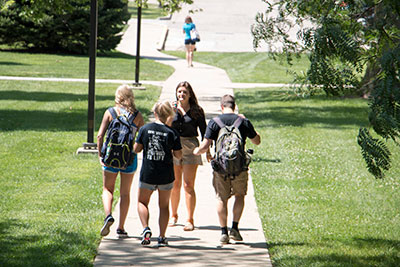
Miami's College of Education, Health and Society receives funding for new STEM scholarship program

National Science Foundation selects Miami team of professors to receive grant for STEM teacher education scholarship program.
by Andrea Rahtz, College of Education, Health and Society
Select teacher education majors from Miami University will soon get a chance to become highly qualified science, technology, engineering and math (STEM) teachers while also learning how to be culturally responsive in a multicultural environment.
The National Science Foundation’s Robert Noyce Scholarship Program has selected a team of experts in the College of Education, Health and Society to receive funding for their idea that will help undergraduate and graduate STEM majors, STEM professionals and STEM teacher education majors gain the skills necessary to teach in ethnically and culturally diverse communities.
“Our goal is to use this funding to create a STEM teacher education scholarship program that will not only impart knowledge, but expose students to the experiences they will have in urban communities so they can be culturally responsive in any situation,” says Nazan Bautista, the primary investigator and a science educator in Miami’s College of Education, Health and Society.
She, along with co-primary investigators Jeff Wanko in the College of Education, Health and Society (EHS), Tammy Schwartz in the Urban Teaching Cohort (UTC) program, and Ellen Yezierski and Jennifer Blue in the College of Arts and Sciences (CAS) at Miami University have been awarded $74,956 to begin building their project, Building Capacity for Miami Robert Noyce Scholars.
This award is the first in a series of steps that will help the team move forward on program designs geared toward attracting and retaining aspiring STEM teachers committed to a high-needs local school district for two years after graduation. Among these attractions will be scholarship opportunities and stipend options for talented STEM undergraduates and STEM career professionals to pursue secondary teacher certification (Grades 7-12) in either science or mathematics at Miami. The project team will also develop a mentoring and professional development program supporting teacher candidates during the initial years of their full-time teaching.
“This capacity building proposal for the MU-Noyce Scholars project is well designed [and] represents a novel approach to STEM teacher preparation in urban settings including the emphasis on culturally responsive teaching and immersion in field experiences beginning after the freshman year,” wrote a National Science Foundation reviewer.
Miami’s team of experts hopes their project will provide a model for STEM teacher education programs in other institutions. Their goal is to prepare teachers who understand the characteristics and contributions of different ethnic groups, incorporate diverse content into their curriculums, and understand how different ethnic communication styles reflect cultural values and shape learning behavior. All this, they believe, should be done responsibly while realizing the intellectual potential of a diverse student classroom and spreading that idea to others.
